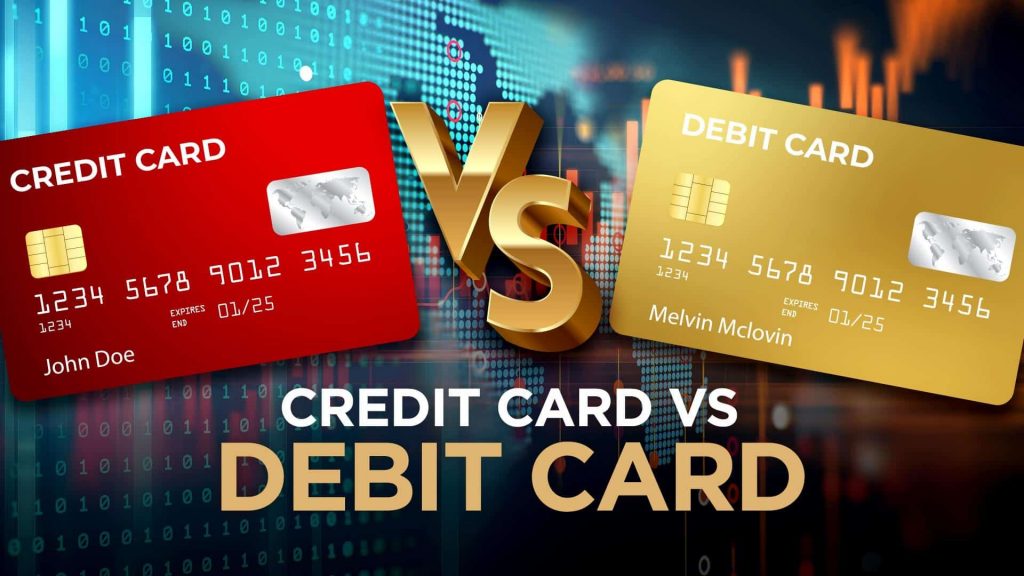What is the difference between a Debit Card and a Credit Card?
When you use your debit card to pay for goods and services, the full amount of the transaction is withdrawn from your checking account immediately, providing there is sufficient funds to cover the purchase. Otherwise, the transaction will be declined.
However, when you use your credit card to pay for goods and services, the credit card company allows you to borrow the money up to your credit limit amount for a period of time — called the grace period — before you have to repay it. No money is withdrawn from your account for your purchase but if the purchase goes over your credit limit the transaction will be declined.
At the end of your credit card billing cycle, the credit card company sends a bill that tells you when the money you borrowed must be repaid. Failure to pay off your credit card bill in full will result in interest payment. And if you missed the bill payment due date, the credit card company charges you a mis-payment fee on top of the interest charged.
Apart from the payment due date, your credit card bill will also show a minimum payment amount. This means, unlike using your debit card that removes the full amount of the transaction from your account at the time of purchase, using your credit card allows you to repay less than the amount of your full purchase.
As long as you make the minimum payment by the due date, you’re not charged a mis-payment fee. However, you will be charged interest on the purchases you made, and on ALL subsequent purchases until you pay off your outstanding balance in full.
A debit card and a credit card can both be used at the ATM to access cash. However, while the debit card may only attract a transaction fee depending on your account, the credit card will attract the transaction fee as well as interest that starts accruing the moment the money is withdrawn until it is repaid in full.
Should I Use A Credit Card or A Debit Card?
The table below gives some examples of the pros and cons of using either card, but they are not limited to the ones shared here.
| Debit Card | Credit Card | ||
| Pros | Cons | Pros | Cons |
| Cannot spend more than you have | Doesn’t build your credit | Builds your credit | Allows you to spend more than you have |
| No interest charge | No grace period for purchases | Grace period to repay loan at no interest | Interest charge if you carry a balance |
| Account is updated after each transaction | No reward points | Reward points to purchase gift cards or buy plane tickets | Put you in debt |
| Doesn’t put you in debt | Limited protection against fraud | More protection against fraud | Possibly annual fees |
| Limits indiscipline spending | No insurance coverage | Rental car coverage | Encourages indiscipline spending |
| No annual fee | Possibly monthly fee | Travel /Trip cancellation insurance | |
| Fast access to cash | Possibly debit transaction fee | No transaction fee | |
| No balance transfer | 0% Introductory balance transfer | ||
| No promo on purchases | 0% intro promo on purchases |
The following link also takes you to a video that shares some key things to consider when deciding whether to use a credit or debit card.
Video: https://www.youtube.com/watch?v=xKYVtDA_HlM&t=8s&ab_channel=ClintCoons%3ARealEstateAssetProtection
Both cards have advantages and disadvantages, but I believe the advantages of the credit card far exceed those of the debit card. For this reason, I personally prefer to use a credit card to pay for goods and purchases for 3 main purposes:
- Protection against fraud – I don’t have to pay for purchases I didn’t make
- Reward Points – I redeem my points for plane tickets and gift cards
- Builds my credit history – My bank gives me good mortgage rates because of my good credit history
However, depending on your spending habits, and how responsible and disciplined you are with your money, a debit card may be more suitable for you.
The minimum payment amount concept, the high interest rates and the hidden fees on a credit card can push you deeper and deeper into debt at the blink of an eye. Hence, you must weigh the pros and cons of using each card before you choose the one that you want to use to make the transaction.

